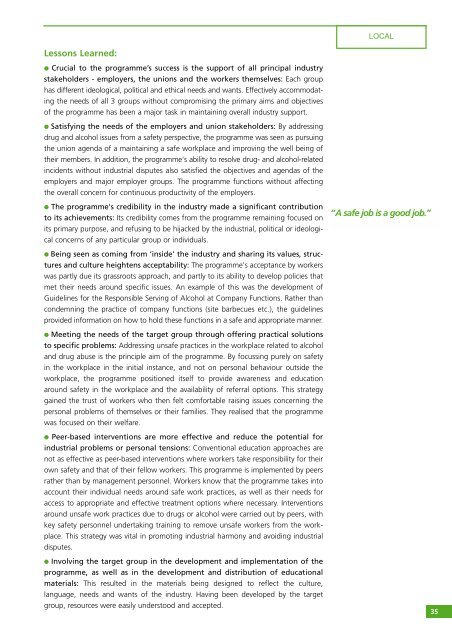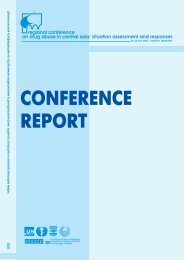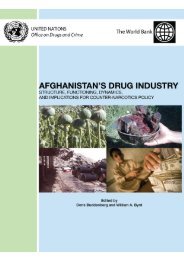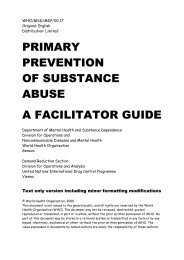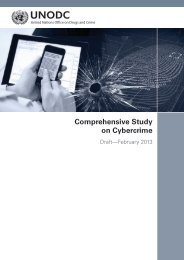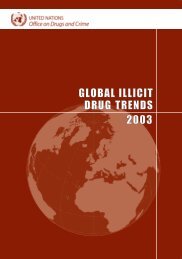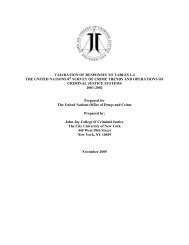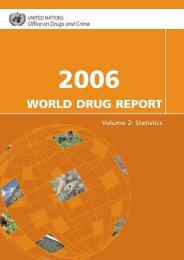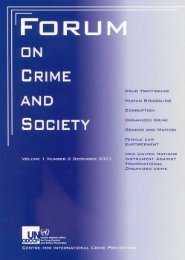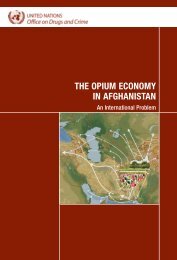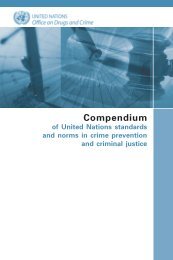PDF (Lessons learned in drug abuse prevention: a global review)
PDF (Lessons learned in drug abuse prevention: a global review)
PDF (Lessons learned in drug abuse prevention: a global review)
Create successful ePaper yourself
Turn your PDF publications into a flip-book with our unique Google optimized e-Paper software.
LOCAL<br />
<strong>Lessons</strong> Learned:<br />
● Crucial to the programme’s success is the support of all pr<strong>in</strong>cipal <strong>in</strong>dustry<br />
stakeholders - employers, the unions and the workers themselves: Each group<br />
has different ideological, political and ethical needs and wants. Effectively accommodat<strong>in</strong>g<br />
the needs of all 3 groups without compromis<strong>in</strong>g the primary aims and objectives<br />
of the programme has been a major task <strong>in</strong> ma<strong>in</strong>ta<strong>in</strong><strong>in</strong>g overall <strong>in</strong>dustry support.<br />
● Satisfy<strong>in</strong>g the needs of the employers and union stakeholders: By address<strong>in</strong>g<br />
<strong>drug</strong> and alcohol issues from a safety perspective, the programme was seen as pursu<strong>in</strong>g<br />
the union agenda of a ma<strong>in</strong>ta<strong>in</strong><strong>in</strong>g a safe workplace and improv<strong>in</strong>g the well be<strong>in</strong>g of<br />
their members. In addition, the programme's ability to resolve <strong>drug</strong>- and alcohol-related<br />
<strong>in</strong>cidents without <strong>in</strong>dustrial disputes also satisfied the objectives and agendas of the<br />
employers and major employer groups. The programme functions without affect<strong>in</strong>g<br />
the overall concern for cont<strong>in</strong>uous productivity of the employers.<br />
● The programme's credibility <strong>in</strong> the <strong>in</strong>dustry made a significant contribution<br />
to its achievements: Its credibility comes from the programme rema<strong>in</strong><strong>in</strong>g focused on<br />
its primary purpose, and refus<strong>in</strong>g to be hijacked by the <strong>in</strong>dustrial, political or ideological<br />
concerns of any particular group or <strong>in</strong>dividuals.<br />
● Be<strong>in</strong>g seen as com<strong>in</strong>g from ‘<strong>in</strong>side’ the <strong>in</strong>dustry and shar<strong>in</strong>g its values, structures<br />
and culture heightens acceptability: The programme's acceptance by workers<br />
was partly due its grassroots approach, and partly to its ability to develop policies that<br />
met their needs around specific issues. An example of this was the development of<br />
Guidel<strong>in</strong>es for the Responsible Serv<strong>in</strong>g of Alcohol at Company Functions. Rather than<br />
condemn<strong>in</strong>g the practice of company functions (site barbecues etc.), the guidel<strong>in</strong>es<br />
provided <strong>in</strong>formation on how to hold these functions <strong>in</strong> a safe and appropriate manner.<br />
● Meet<strong>in</strong>g the needs of the target group through offer<strong>in</strong>g practical solutions<br />
to specific problems: Address<strong>in</strong>g unsafe practices <strong>in</strong> the workplace related to alcohol<br />
and <strong>drug</strong> <strong>abuse</strong> is the pr<strong>in</strong>ciple aim of the programme. By focuss<strong>in</strong>g purely on safety<br />
<strong>in</strong> the workplace <strong>in</strong> the <strong>in</strong>itial <strong>in</strong>stance, and not on personal behaviour outside the<br />
workplace, the programme positioned itself to provide awareness and education<br />
around safety <strong>in</strong> the workplace and the availability of referral options. This strategy<br />
ga<strong>in</strong>ed the trust of workers who then felt comfortable rais<strong>in</strong>g issues concern<strong>in</strong>g the<br />
personal problems of themselves or their families. They realised that the programme<br />
was focused on their welfare.<br />
● Peer-based <strong>in</strong>terventions are more effective and reduce the potential for<br />
<strong>in</strong>dustrial problems or personal tensions: Conventional education approaches are<br />
not as effective as peer-based <strong>in</strong>terventions where workers take responsibility for their<br />
own safety and that of their fellow workers. This programme is implemented by peers<br />
rather than by management personnel. Workers know that the programme takes <strong>in</strong>to<br />
account their <strong>in</strong>dividual needs around safe work practices, as well as their needs for<br />
access to appropriate and effective treatment options where necessary. Interventions<br />
around unsafe work practices due to <strong>drug</strong>s or alcohol were carried out by peers, with<br />
key safety personnel undertak<strong>in</strong>g tra<strong>in</strong><strong>in</strong>g to remove unsafe workers from the workplace.<br />
This strategy was vital <strong>in</strong> promot<strong>in</strong>g <strong>in</strong>dustrial harmony and avoid<strong>in</strong>g <strong>in</strong>dustrial<br />
disputes.<br />
● Involv<strong>in</strong>g the target group <strong>in</strong> the development and implementation of the<br />
programme, as well as <strong>in</strong> the development and distribution of educational<br />
materials: This resulted <strong>in</strong> the materials be<strong>in</strong>g designed to reflect the culture,<br />
language, needs and wants of the <strong>in</strong>dustry. Hav<strong>in</strong>g been developed by the target<br />
group, resources were easily understood and accepted.<br />
“A safe job is a good job.”<br />
35


